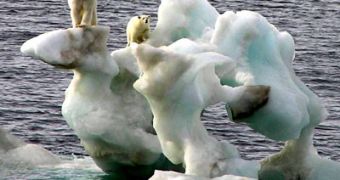By now, it is no secret that climate change and global warming are toying with the planet's ice coverage, causing the Arctic to melt and the permafrost to thaw.
However, one researcher working with the Harvard University is convinced that both refreezing the Arctic, and cooling down the earth in its entirety are well within reach, provided that nations worldwide agree to chip in and raise $8 billion (€6.16 billion) on a yearly basis.
This money would be spent on “flooding” the atmosphere with relatively small particles whose makeup would allow them to reflect whatever sunlight hits the atmosphere.
By limiting the amount of sunlight that hits the Earth on a regular basis, polar ice might soon be restored to its former glory.
As well as this, it is quite likely that a drop in global average temperatures will also be registered, Daily Mail explains.
David Keith, the professor of applied physics who thoroughly investigated the possibility of using reflective particles to deal with the effects of climate change and global warming, made a case of how, “The really hard questions here aren’t mostly technical. They’re questions about what kind of planet we want and who we are.”
One of the papers published by David Keith on this topic states that, should the technologies we have at our disposal allow us to reduce the penetration of sunlight by a mere 0.5 percent, the ice coverage around the North Pole would most likely be back to its pre-industrial era levels.
Interestingly enough, one other of David Keith's papers argues that the main resources needed in order to spray reflective particles into the atmosphere are a few Gulfstream jets.
For the time being at least, Professor David Keith is not convinced that such large-scale geoengineering could be used for other purposes except dealing with a sudden and massive collapse of the Earth's ice coverage, or with a severe drought.
As this researcher explains, long-term solutions to global warming need inevitably focus on cutting down on the amounts of pollution human society produces on a daily basis.

 14 DAY TRIAL //
14 DAY TRIAL //